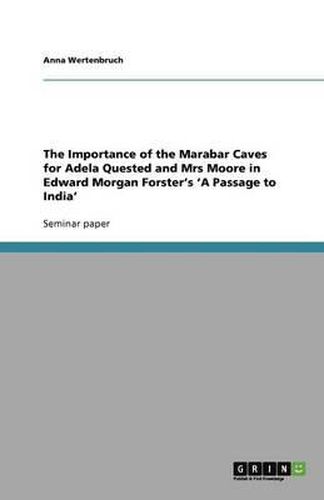Readings Newsletter
Become a Readings Member to make your shopping experience even easier.
Sign in or sign up for free!
You’re not far away from qualifying for FREE standard shipping within Australia
You’ve qualified for FREE standard shipping within Australia
The cart is loading…






Seminar paper from the year 2009 in the subject English Language and Literature Studies - Culture and Applied Geography, grade: 1,3, Ruhr-University of Bochum (Englisches Seminar), course: Heritage Films, language: English, abstract: The novel A Passage to India written by Edward Morgan Forster was published in 1924 and has given rise to several discussions. Sixty Years later David Lean made a film based on Forster’s novel, which was representative of a whole range of films of this decade dealing with the construction of Englishness and trying to revive the imperial or Edwardian past in a nostalgic and Anglo-centric manner (Nischik 301). The film is part of the so-called heritage industry thriving in Thatcher Britain and is supported by political orders and acts like the National Heritage Act of 1980 and 1983. In that time the political importance of Britain decreased and there were challenges to the national sovereignty and unity by the European integration process as well as disintegrative developments in Northern Ireland. Therefore the construction of traditional Englishness and of imperial dominance in the cultural format of quality films became one of Britain’s most important export article (Nischik 302). But those national identities such as ‘Englishness’ are cultural constructions and symbolic self-representations which come to equate social facts. In the context of social and political integration, literary texts play an important and privileged role and complement the affirmative appeal of popular films produced for the cinema (Nischik 303). The novel A Passage to India avoids simplistic idealizations of Anglo-Indian relations and Englishness when constructing it and wants its readers to confront the truths about their inner selves and their relation to the world (Yarrow 1). Forster describes different worldviews in his novel without privileging one above another and lets his characters search for paths towards individual truths and an opening up of the dee
$9.00 standard shipping within Australia
FREE standard shipping within Australia for orders over $100.00
Express & International shipping calculated at checkout
Seminar paper from the year 2009 in the subject English Language and Literature Studies - Culture and Applied Geography, grade: 1,3, Ruhr-University of Bochum (Englisches Seminar), course: Heritage Films, language: English, abstract: The novel A Passage to India written by Edward Morgan Forster was published in 1924 and has given rise to several discussions. Sixty Years later David Lean made a film based on Forster’s novel, which was representative of a whole range of films of this decade dealing with the construction of Englishness and trying to revive the imperial or Edwardian past in a nostalgic and Anglo-centric manner (Nischik 301). The film is part of the so-called heritage industry thriving in Thatcher Britain and is supported by political orders and acts like the National Heritage Act of 1980 and 1983. In that time the political importance of Britain decreased and there were challenges to the national sovereignty and unity by the European integration process as well as disintegrative developments in Northern Ireland. Therefore the construction of traditional Englishness and of imperial dominance in the cultural format of quality films became one of Britain’s most important export article (Nischik 302). But those national identities such as ‘Englishness’ are cultural constructions and symbolic self-representations which come to equate social facts. In the context of social and political integration, literary texts play an important and privileged role and complement the affirmative appeal of popular films produced for the cinema (Nischik 303). The novel A Passage to India avoids simplistic idealizations of Anglo-Indian relations and Englishness when constructing it and wants its readers to confront the truths about their inner selves and their relation to the world (Yarrow 1). Forster describes different worldviews in his novel without privileging one above another and lets his characters search for paths towards individual truths and an opening up of the dee